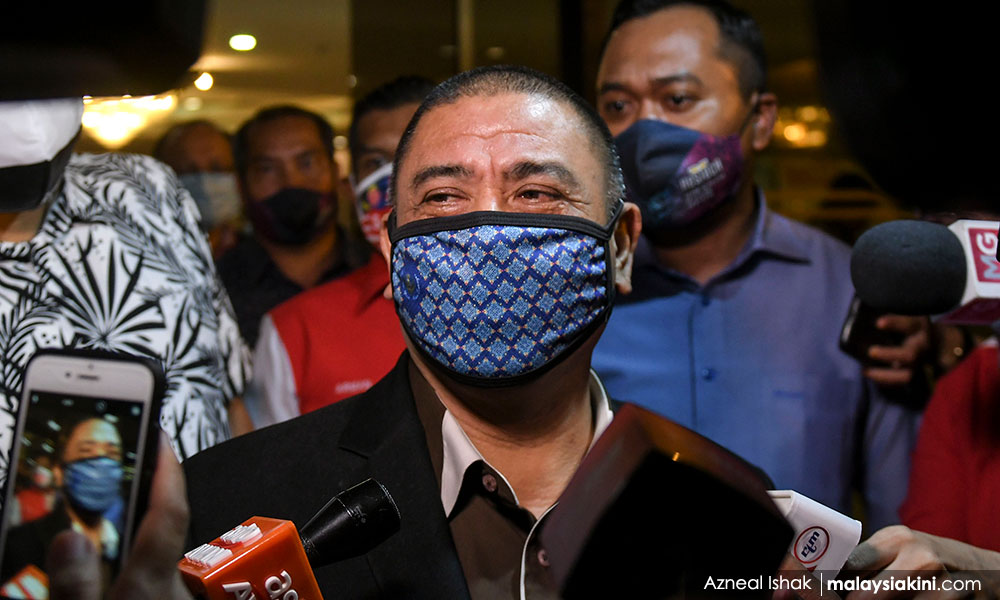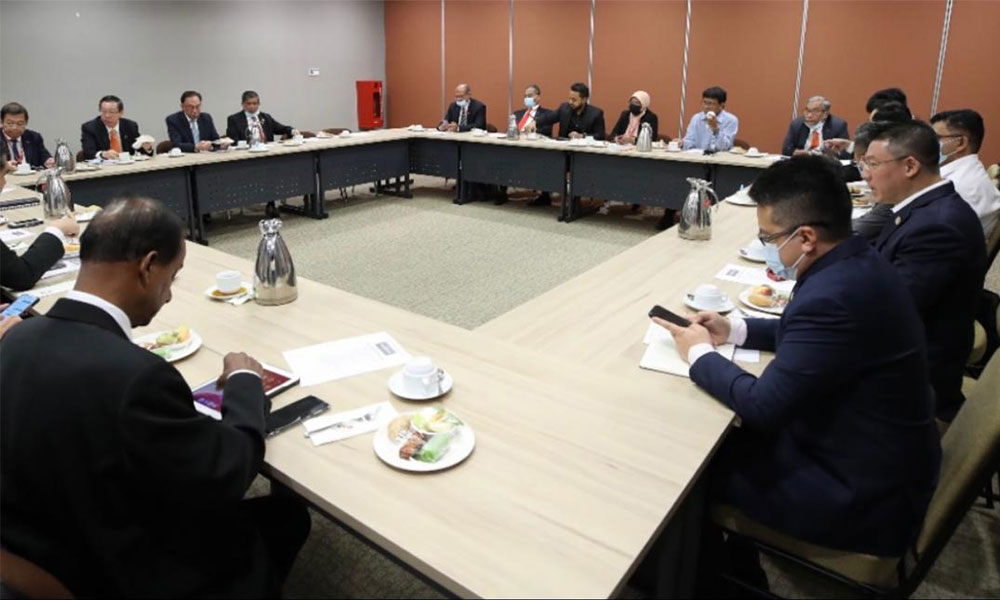Less than two weeks after Ahmad Faizal Azumu was removed by a vote as menteri besar in Perak, the Pakatan Harapan opposition and Perikatan Nasional (PN) state government - now led by Umno’s Saarani Mohamad - have sealed a deal through a Confidence and Supply Agreement (CSA) that will allow for modest reforms in governance in the state.
If it holds, this deal represents an important shift towards greater partisan cooperation, a move away from the zero-sum polarising politics that have pitted Malaysians against Malaysians and divided the country. This milestone showcases greater pragmatism and a return to the needed focus on reform, in a year where reforms have been brutally battered by power struggles, greed, and blind personal ambition.
Checking and balancing
The key measures of Perak’s CSA include fair and equal allocation of constituency funds to all representatives, official recognition of the opposition (with funds for administrative support), inclusion of the opposition in district committees and in the state Public Accounts Committee (PAC) and an agreement to maintain funding for vernacular schools.
The measures provide for greater checks and balances in governance by including opposition members in decision-making bodies and strengthening the role of the opposition in the legislature. Importantly, given the ethno-nationalist exclusion of PN of ethnic minorities, this agreement provides venues for greater minority representation as well as protections for funding for minorities in areas such as vernacular schools.
The CSA allows for safe passage of the budget in Perak. A similar less formalised and less inclusive of reform agreement was reached in Johor before their budget vote earlier this month.
The most salient balancing force is that the agreement empowers Umno vis-à-vis its PN alliance partners, Bersatu and PAS, providing broader support for Saarani’s leadership at the state level. This allows for greater political stability while providing Umno’s leadership of the state more room to address the serious problematic legacies of Ahmad Faizal’s tenure.

From land deals to mismanagement of many of the government-linked companies, Perak had had a slew of scandals that have called out for a needed clean-up. The CSA puts in place conditions that will allow for greater scrutiny, and modestly check the predatory practices of greedy patronage politics that plague state governance.
While realism should colour our understanding of how much clean-up can and will happen given long-standing practices of patronage honed by Umno and the predominant views that holding government is entitlement rather than service, the CSA provides new checks.
From failure to agreement
Perak’s CSA agreement emerged out of failure. The broader political environment of the political and national crisis has created conditions that are pressuring politicians, who are losing ground among their grassroots and facing unprecedented public criticism for incompetence and misplaced priorities, to find new solutions.
Three factors set the backdrop to this agreement:
1. No election exit strategy: the inability to call an election to resolve political differences due to Covid-19;
2. Unhappy partnerships: dissatisfaction within alliances (both PN and Harapan) in their leadership and governance;
3. Failed new alliances: inability of leaders and parties to find new partners due to a lack of trust, long-standing enmity and persistent personal antagonisms.
That this agreement comes on the heels of a contentious federal budget vote in which opposition leader Anwar Ibrahim failed to deliver enough support in his leadership and fulfil his repeated claims of having the ‘numbers’ to oust PN should not be a surprise. The move for a CSA - driven primarily by Amanah and DAP- reflects a step towards a different type of politics, towards more cooperation rather than confrontation, while still maintaining space for criticism.
The CSA allows reform to be institutionalised without having to be in the leadership seat, bringing the opposition into government in a more constructive manner. With the path to federal government blocked, politicians have had to find different ways to achieve their goals. It also allows new relationships to evolve, not led from the centre and around key individuals. Anwar’s repeated failures have encouraged others to find other ways to have influence in governance.
The failures driving the CSA were also at the state level. The musical chairs surrounding who will lead Perak and with whom last week were an embarrassment. They received a well-deserved sultan rebuke. While the most shame went to PAS in its cancellation of its meeting with the sultan, all of the political parties came off badly. Greed, selfishness and lack of statesmanship were on display, with the negotiations over the composition of a potential government foolishly playing out in media statements rather than in a meeting room.

Umno and DAP faced the most serious backlash from its willingness to explore possible cooperation in government. It is not surprising that they are the drivers of the CSA, as it is in many ways a face-saving agreement. Yet is also reflects hard work - one reached through difficult unpublicised negotiations with an appreciation of the need to address public concerns about why Umno, Harapan partners and DAP were discussing working together. Rather than being in government, a CSA allows parties to adopt their more comfortable roles as government and opposition.
Hazards ahead
Making agreements hold is arguably more difficult than reaching the agreement itself. Malaysia has learned the hard way this year that agreements depend on personalities keeping their promises and working to make sure that supporters do not sabotage relationships. Working agreements require statesmanship and hard work.
Three hazards are ahead. The first is distrust. The failure of Harapan and Umno to reach an agreement to cooperate exposed the deep distrust that exists on different political sides. The CSA can only work if there is a willingness to develop trust, to not resort to the old tried (and trying) pattern of attack and exposing differences in public. Inevitably there will problems - a test will be the reaction, or rather the potential overreaction, to those problems.
Second, given that the CSA reflects a different type of politics which will institutionalise more accountability and transparency, there will be resistance, even sabotage. Without a mechanism to maintain communication and pressure for keeping commitments, the CSA can collapse.
Third, there will be tendencies to use the agreement as fodder to fuel further tensions within existing political alliances. This will intensify pressure on already pre-existing strains, potentially creating a situation where the CSA itself unconstructively becomes a source of disagreement.
The newly-minted agreement has yet to find its legs and be tested. Be assured it will indeed be tested.
For now, however, the CSA marks a graduation in Malaysian politics, with more respect of the different roles that parties across the political parties can provide in governance. It removes the unfair punishment of denying constituency funds for voting for the opposition. It also moves Malaysian politics - very modestly - towards multi-partisan cooperation and towards a middle ground.
After decades of polarising politics, and months of witnessing the costs of hubris, personal antagonism and personal ambition, ironically after failures, there is the promise of success in new reforms.
BRIDGET WELSH is a Senior Research Associate at the Hu Fu Centre for East Asia Democratic Studies and a Senior Associate Fellow of The Habibie Centre. She currently is an Honorary Research Associate of the University of Nottingham, Malaysia's Asia Research Institute (Unari) based in Kuala Lumpur. She tweets at @dririshsea. - Mkini
The views expressed here are those of the author/contributor and do not necessarily represent the views of MMKtT.




No comments:
Post a Comment
Note: Only a member of this blog may post a comment.